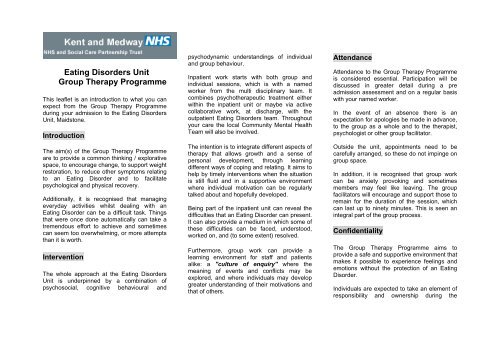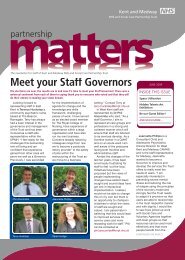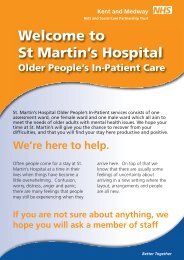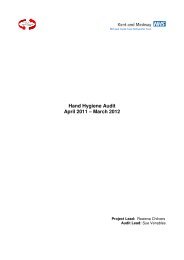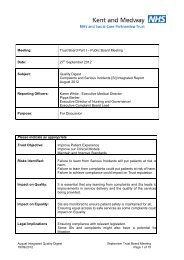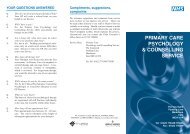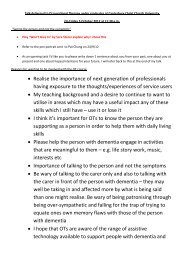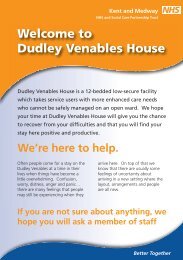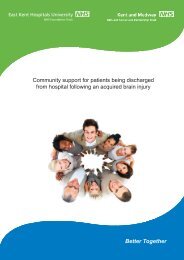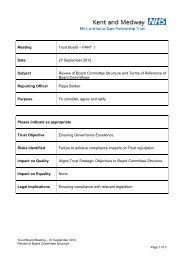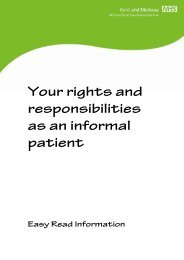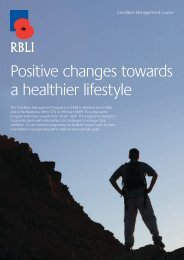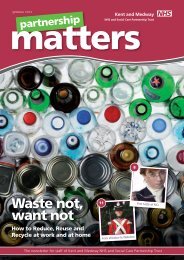Group therapy leaflet
Group therapy leaflet
Group therapy leaflet
- No tags were found...
You also want an ePaper? Increase the reach of your titles
YUMPU automatically turns print PDFs into web optimized ePapers that Google loves.
Eating Disorders Unit<strong>Group</strong> Therapy ProgrammeThis <strong>leaflet</strong> is an introduction to what you canexpect from the <strong>Group</strong> Therapy Programmeduring your admission to the Eating DisordersUnit, Maidstone.IntroductionThe aim(s) of the <strong>Group</strong> Therapy Programmeare to provide a common thinking / explorativespace, to encourage change, to support weightrestoration, to reduce other symptoms relatingto an Eating Disorder and to facilitatepsychological and physical recovery.Additionally, it is recognised that managingeveryday activities whilst dealing with anEating Disorder can be a difficult task. Thingsthat were once done automatically can take atremendous effort to achieve and sometimescan seem too overwhelming, or more attemptsthan it is worth.InterventionThe whole approach at the Eating DisordersUnit is underpinned by a combination ofpsychosocial, cognitive behavioural andpsychodynamic understandings of individualand group behaviour.Inpatient work starts with both group andindividual sessions, which is with a namedworker from the multi disciplinary team. Itcombines psychotherapeutic treatment eitherwithin the inpatient unit or maybe via activecollaborative work, at discharge, with theoutpatient Eating Disorders team. Throughoutyour care the local Community Mental HealthTeam will also be involved.The intention is to integrate different aspects of<strong>therapy</strong> that allows growth and a sense ofpersonal development, through learningdifferent ways of coping and relating. It aims tohelp by timely interventions when the situationis still fluid and in a supportive environmentwhere individual motivation can be regularlytalked about and hopefully developed.Being part of the inpatient unit can reveal thedifficulties that an Eating Disorder can present.It can also provide a medium in which some ofthese difficulties can be faced, understood,worked on, and (to some extent) resolved.Furthermore, group work can provide alearning environment for staff and patientsalike: a "culture of enquiry" where themeaning of events and conflicts may beexplored, and where individuals may developgreater understanding of their motivations andthat of others.AttendanceAttendance to the <strong>Group</strong> Therapy Programmeis considered essential. Participation will bediscussed in greater detail during a preadmission assessment and on a regular basiswith your named worker.In the event of an absence there is anexpectation for apologies be made in advance,to the group as a whole and to the therapist,psychologist or other group facilitator.Outside the unit, appointments need to becarefully arranged, so these do not impinge ongroup space.In addition, it is recognised that group workcan be anxiety provoking and sometimesmembers may feel like leaving. The groupfacilitators will encourage and support those toremain for the duration of the session, whichcan last up to ninety minutes. This is seen anintegral part of the group process.ConfidentialityThe <strong>Group</strong> Therapy Programme aims toprovide a safe and supportive environment thatmakes it possible to experience feelings andemotions without the protection of an EatingDisorder.Individuals are expected to take an element ofresponsibility and ownership during the
group(s). Each person will be encouraged (atsome points) to take on active roles. It is feltthat individuals have the right to expressopinions that maybe the same or different toothers.As the <strong>Group</strong> Therapy Programme is afundamental part of treatment, its contents /findings will be shared with themultidisciplinary team and is regarded as agood indicator on how people are developingand relating.Examples of the types of <strong>Group</strong>WorkThe <strong>Group</strong> Therapy Programme is divided intofour components 1) Educative 2) Talking 3)Creative 4) Practical. All of which will bereviewed on a twelve weekly basis. Some ofthese will remain on the programme for theduration; others will change according to need.Educative – such as Body Image, AnxietyManagement. These types of groups exploresome of the mechanisms that underlie howthoughts may come to affect and interact withfeelings. These processes are explored whichchallenges some of the thinking that leads tofalse beliefs and unhealthy behaviours.Talking – such as Process, Relationship andWorking in the Here and Now. These groupsare non-structured and provide a talking forumwithin which feelings are shared and explored.These are identified by sharing theexperiences of others and by exploring thedynamic issues that lie behind them. Early intreatment feelings are likely to be closelyconnected to food and weight. Later onfeelings become increasingly about a wholerange of life experiences.Creative – such as Projective Art and CreativeArt / Writing. These groups are used to applynon-verbal ways of identifying feelings. Theparticular creative activity is followed byattempts to share and understand the feelingsthat are exposed.Practical - includes specific groups to learnand manage the day-to-day activities relatingto food management. These groups can helpto develop skills to cope with life without anEating Disorder.The Eating Disorder Team look forward tomeeting you.Contact:Eating Disorders Unit22 Oakapple LaneMaidstoneKentME16 9NWTel: 01622 729980


